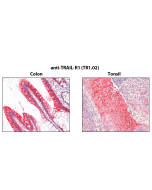Cookie Policy: This site uses cookies to improve your experience. You can find out more about our use of cookies in our Privacy Policy. By continuing to browse this site you agree to our use of cookies.
AdipoGen Life Sciences
anti-TRAIL-R1 (human), mAb (HS101) (Biotin)
As low as
490
CHF
CHF 490.00
In stock
Only %1 left
AG-20B-0022B-C100100 µgCHF 490.00

| Product Details | |
|---|---|
| Synonyms | TRAIL Receptor 1; DR4; APO2; TNFRSF10A; CD261 |
| Product Type | Monoclonal Antibody |
| Properties | |
| Clone | HS101 |
| Isotype | Mouse IgG1 |
| Source/Host | Purified from concentrated hybridoma tissue culture supernatant. |
| Immunogen/Antigen | Recombinant human TRAIL-R1 (DR4). |
| Label/Conjugates | Biotin |
| Application |
Flow Cytometry |
| Crossreactivity | Human |
| Specificity |
Recognizes human TRAIL-R1. Does not cross-react with human TRAIL-R2, -R3 or -R4. |
| Purity | ≥95% (SDS-PAGE) |
| Purity Detail | Protein G-affinity purified. |
| Concentration | 0.5mg/ml |
| Formulation | Liquid. In PBS containing 0.02% sodium azide. |
| Isotype Negative Control | |
| Shipping and Handling | |
| Shipping | BLUE ICE |
| Short Term Storage | +4°C |
| Long Term Storage | -20°C |
| Handling Advice |
After opening, prepare aliquots and store at -20°C. Avoid freeze/thaw cycles. |
| Use/Stability | Stable for at least 1 year after receipt when stored at -20°C. |
| Documents | |
| MSDS |
 Download PDF Download PDF |
| Product Specification Sheet | |
| Datasheet |
 Download PDF Download PDF |
Description
TRAIL-R1 is a receptor for the cytotoxic ligand TRAIL. The adapter molecule FADD recruits caspase-8 to the activated receptor. The resulting death-inducing signaling complex (DISC) performs caspase-8 proteolytic activation which initiates the subsequent cascade of caspases (aspartate-specific cysteine proteases) mediating apoptosis. Promotes the activation of NF-κB.
Product References
- Caspase-10 is recruited to and activated at the native TRAIL and CD95 death-inducing signalling complexes in a FADD-dependent manner but can not functionally substitute caspase-8: M.R. Sprick, et al.; EMBO J. 21, 4520 (2002)
- Mitogen-Activated Protein Kinase/Extracellular Signal-Regulated Kinase Signaling in Activated T Cells Abrogates TRAIL-Induced Apoptosis Upstream of the Mitochondrial Amplification Loop and Caspase-8: T.S. Soderstrom, et al.; J. Immunol. 169, 2851 (2002)
- Proteasome inhibition results in TRAIL sensitization of primary keratinocytes by removing the resistance-mediating block of effector caspase maturation: M. Leverkus, et al.; Mol. Cell. Biol. 23, 777 (2003)
- TNF-Related Apoptosis-Inducing Ligand Mediates Tumoricidal Activity of Human Monocytes Stimulated by Newcastle Disease Virus: B. Washburn, et al.; J. Immunol. 170, 1814 (2003)
- TRAIL regulates normal erythroid maturation through an ERK-dependent pathway: P. Secchiero, et al.; Blood 103, 517 (2004)
- IFN{alpha}-stimulated neutrophils and monocytes release a soluble form of TNF-related apoptosis-inducing ligand (TRAIL/Apo-2 ligand) displaying apoptotic activity on leukemic cells: C. Tecchio, et al.; Blood 103, 3837 (2004)
- Enhanced caspase-8 recruitment to and activation at the DISC is critical for sensitisation of human hepatocellular carcinoma cells to TRAIL-induced apoptosis by chemotherapeutic drugs: T.M. Ganten, et al.; Cell Death Differ. 11 Suppl 1, 86 (2004)
- Casein kinase I attenuates tumor necrosis factor-related apoptosis-inducing ligand-induced apoptosis by regulating the recruitment of fas-associated death domain and procaspase-8 to the death-inducing signaling complex: K. Izeradjene, et al.; Cancer Res. 64, 8036 (2004)
- cFLIPL inhibits tumor necrosis factor-related apoptosis-inducing ligand-mediated NF-kappaB activation at the death-inducing signaling complex in human keratinocytes: T. Wachter, et al.; J. Biol. Chem. 279, 52824 (2004)
- Resistance to FasL and tumor necrosis factor-related apoptosis-inducing ligand-mediated apoptosis in Sezary syndrome T-cells associated with impaired death receptor and FLICE-inhibitory protein expression: E. Contassot, et al.; Blood 111, 4780 (2008)
- TRAIL-R2-specific antibodies and recombinant TRAIL can synergise to kill cancer cells: M.H. Tuthill, et al.; Oncogene 34, 2138 (2015)







